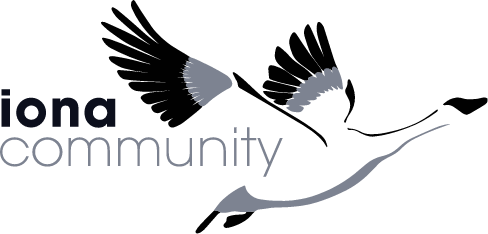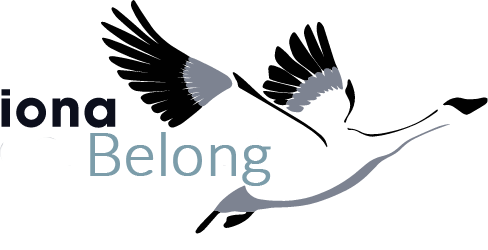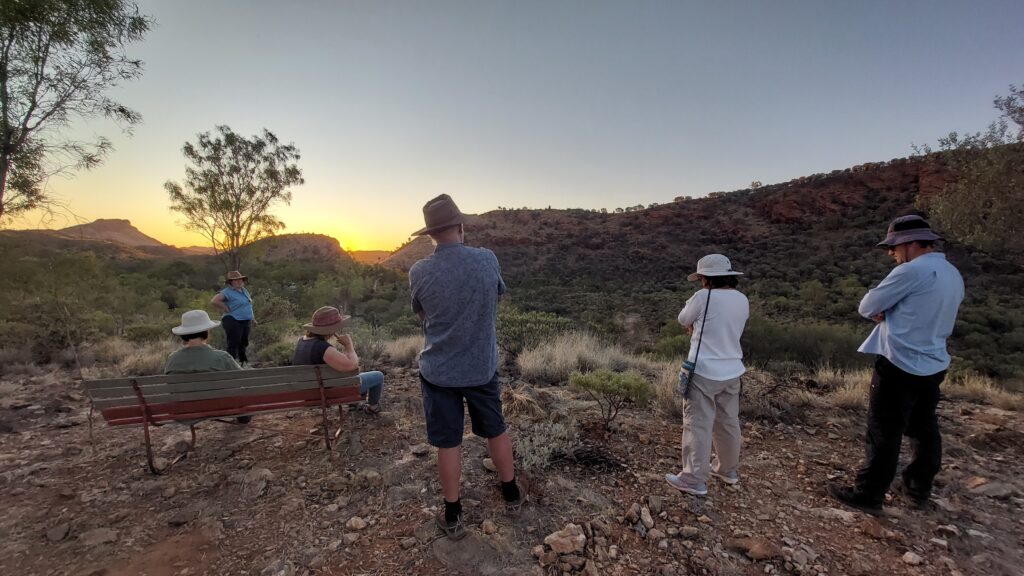Image: Contemplating Country on the Creation Care Listening Pilgrimage. Credit: Iona Community/ N. Austin
My first year university course at Aberdeen in ‘Celtic Studies’ was an eye-opener. Learning Scots Gaelic while being immersed in lectures on Celtic history and literature taught me that multi-vowelled words really are tongue twisters, and that much of what we today call ‘celtic’ history can be speculative and subjective. Place-name studies and complex grammar aside, I was glad to be immersed for a while in the history and language of the land of my birth.
Scroll forward a number of decades, and the invitation to travel through the lands now called Australia on a Creation Care pilgrimage as a ‘Celtic Christian Leader’ meant I had my homework cut out for me. What do we mean by ‘Celtic’ today in Scotland, in a country where just over 1% (2021 census) of the population speak Gaelic? Are we talking about the period of the rise of monasticism in these islands between the 6th and the 9th centuries? Or are we referring to the revival of an interest in all things celtic from the 18th century onwards? Is there such a thing as ‘celtic spirituality’ and how closely can we define this?
In preparation for my travels I read and listened to many on this subject and captured some of these conversations on film in our Celtic Connections series which you can view here. John Bell talks about the myths and legends from his Celtic past that remind him who he is today. Ian Bradley explains the roots of early celtic monasticism and gives us a reality check on what that means now. Sarah Hills, Vicar of Lindisfarne, and Trevor Williams of the Corrymeela Community talk about what it means to belong to the land of the celts. And I explore with Lisa Wriley and Brooke Prentis of the Wellspring Community what it means to be celts in diaspora.
It was a particular joy, therefore, to find myself in the company of Professors Mairéad Nic Craith and Ulli Kockel of the University of the Highlands and Islands, at Iona Abbey last week. Leading a programme called ‘Dùthchas and Everyday Celtic Spirituality’. Ulli and Mairéad opened up for us the concept of ‘dùthchas’; an understanding of land, community, culture, belonging to place, and land-based learning, informed by a sense of the mystery, the divine.
There were resonances for me with the idea of ‘anaditj’ I learned from our indigenous Aboriginal friends in Australia – that ‘the way things are’ is understood through walking with our history on our shoulders. Or the concept of ‘cynefin’ in Welsh, expanding that sense of belonging to land through culture, history, language and spirituality. Many struggle to find one single word in English that conveys a similar meaning. ‘Heritage’, as we explored on Iona last week, doesn’t really convey that sense of mystery. Matthew Oates in his article ‘Putting my Land-Longing into Words’ suggests that ‘heartland’ is maybe the nearest word in English to capture this meaning. There is always more for us to learn, as a community, about our roots and our belonging.
In this election week in the UK, however, and having heard a glimpse of the latest TV debate between prospective USA presidential candidates, I remain gripped by the incarnation. What does all this learning have to teach us about the present? What would Jesus ask of us in the current economic, political and environmental context? I imagine he would say listen to the poorest; seek wisdom from the mourning; learn from the peacemakers; follow the example of the justice seekers (Matthew 5). As we continue to do the important work of understanding our roots, our belonging, our ‘dùthchas’, let us remember the wisdom from scripture, and other sources of nourishment, that orientate our lives around justice and peace.


